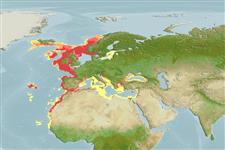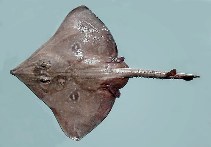مشاهدات خود را اضافه کنيد در Fish Watcher
| Native range | All suitable habitat | Point map | Year 2050 |

|
| This map was computer-generated and has not yet been reviewed. |
| Dipturus batis AquaMaps Data sources: GBIF OBIS |
را بارگذاری کني تصاوير و فيلم ها
Pictures | Stamps, coins, misc. | تصوير گوگلDipturus batis
Male picture by Cambraia Duarte, P.M.N. (c)ImagDOP
Pictures | Stamps, coins, misc. | تصوير گوگلDipturus batis
Male picture by Cambraia Duarte, P.M.N. (c)ImagDOP
Norway country information
Common names:
Glattrokke, Glattskate, Storskate
Occurrence: native
Salinity: marine
Abundance: | Ref:
Importance: | Ref:
Aquaculture: | Ref:
Regulations: | Ref:
Uses: no uses
Comments:
National Checklist:
Country Information: https://www.cia.gov/library/publications/resources/the-world-factbook/geos/no.html
National Fisheries Authority: http://odin.dep.no/fid/eng/
Occurrences: Occurrences Point map
Main Ref: Muus, B. and P. Dahlström, 1978
National Database:
Occurrence: native
Salinity: marine
Abundance: | Ref:
Importance: | Ref:
Aquaculture: | Ref:
Regulations: | Ref:
Uses: no uses
Comments:
National Checklist:
Country Information: https://www.cia.gov/library/publications/resources/the-world-factbook/geos/no.html
National Fisheries Authority: http://odin.dep.no/fid/eng/
Occurrences: Occurrences Point map
Main Ref: Muus, B. and P. Dahlström, 1978
National Database:
Common names from other countries
رده بندی / Names اسامي عام | مترادف | Catalog of Fishes(جنس, گونه ها) | ITIS | CoL | WoRMS | Cloffa
(كوسه ها و سپرماهيان) (sharks and rays) > Rajiformes (Skates and rays) > Rajidae (Skates)
Etymology: Dipturus: Greek, di = two + Greek, pteryx = fin (Ref. 45335).
More on author: Linnaeus.
Etymology: Dipturus: Greek, di = two + Greek, pteryx = fin (Ref. 45335).
More on author: Linnaeus.
Environment: milieu / climate zone / depth range / distribution range بوم شناسي
دريايي نزديك كف زي; تغييرات عمق 100 - 1000 m (Ref. 4426), usually 30 - 600 m (Ref. 127222). Temperate; 70°N - 48°N, 30°W - 20°E (Ref. 127222)
پراكنش كشورها | مناطق سازمان خوار و بار جهاني (FAO) | Ecosystems | ظهور | Point map | معرفي | Faunafri
Northeastern Atlantic: Iceland to the British isles; it was formerly more widespread, including the Mediterranean Sea and North Africa, but the range is thought to be reduced due to fishing.
Length at first maturity / Size / Weight / سن
Maturity: Lm 160.0 range ? - ? cm
Max length : 285 cm TL جنس نر / بدون خواص جنسي; (Ref. 35388); common length : 100.0 cm TL جنس نر / بدون خواص جنسي; (Ref. 3261); بيشينه وزن گزارش شده: 113.0 kg (Ref. 114424); بيشينه سن گزارش شده: 51 سال ها (Ref. 4483)
Max length : 285 cm TL جنس نر / بدون خواص جنسي; (Ref. 35388); common length : 100.0 cm TL جنس نر / بدون خواص جنسي; (Ref. 3261); بيشينه وزن گزارش شده: 113.0 kg (Ref. 114424); بيشينه سن گزارش شده: 51 سال ها (Ref. 4483)
توصيف مختصر كليدهاي شناسايي | ريخت شناسي | ريخت ستجي بوسيله انداره گيري
خارهاي باله پشتي (کل) : 0; خارهاي باله مخرجي: 0. This species is characterized by the following: snout broadly angular, length 5-6.3 times orbit length; disc broadly rhombic, anterior margin deeply concave; a row of 12-31 predorsal thorns in median row along tail (disc smooth in young; denticles confined to dorsal head and along anterior disc margin on both surfaces in adults; disc thorns small in young, largely absent in adults); lateral thorns on tail perpendicular to body axis; interspace between dorsal fins 1.2 ± 0.4 TL, the fins rounded, upright, near tail tip; upper surface olive-grey or brown with a variable pattern of light blotches, with yellowish ring-like markings; underside greyish; iris yellowish (Ref. 114953, 127223).
Benthic species in shelf and slope waters, mainly within the 200 m range along the continental shelf, but down to 600 m along continental slopes and seamounts (Ref. 127222). Feeds on all kinds of bottom invertebrates and fish, including other skates (Ref. 114953). Oviparous, with long embryonic development. Males reach maturity at ca. 115 cm TL, females at 123 cm TL; birth size at ca. 21 cm TL (Ref. 114953). Biology may be unclear due to past taxonomic confusion Distinct pairing with embrace. Young may tend to follow large objects, such as their mother (Ref. 205). Mate in spring and the egg capsules are laid during the summer. Eggs are oblong capsules with stiff pointed horns at the corners deposited in sandy or muddy flats (Ref. 205). Egg capsules are 10.6-24.5 cm long and 5.0-14.5 cm wide (Ref. 41250). About 40 eggs per individual are laid annually (Ref. 41250). Flesh is marketed fresh or smoked (Ref. 35388).
Life cycle and mating behavior بلوغ | تولید مثل | تخم ریزی | تخم ها | Fecundity | توزاد ( لارو)
Oviparous, paired eggs are laid. Embryos feed solely on yolk (Ref. 50449). Egg-cases laid in spring and summer, very large (Ref. 3167). Distinct pairing with embrace. Young may tend to follow large objects, such as their mother (Ref. 205). Eggs have horn-like projections on the shell (Ref. 205).
مآخذ اصلی
Upload your references | مراجع | هماهنگ كننده : McEachran, John | همكاران
McEachran, J.D. and K.A. Dunn, 1998. Phylogenetic analysis of skates, a morphologically conservative clade of elasmobranchs (Chondrichthyes: Rajidae). Copeia 1998(2):271-290. (Ref. 27314)
وضعيت در فهرست قرمز IUCN (Ref. 130435: Version 2024-1)
درمعرض خطر بحرانی (CR) (A2bcd); Date assessed: 02 April 2021
خطر برای انسان ها
Harmless
استفاده انسانی
ماهي گيري – شيلات: ارزش تحاري اندك; ماهي ها ي سرگرم كننده: بله
FAO(ماهي گيري – شيلات: production; publication : search) | FishSource | Sea Around Us
اطلاعات بيشتر
Population dynamics
Growth parameters
Max. ages / sizes
Length-weight rel.
Length-length rel.
نوسانات طولی
Mass conversion
بازسازی
فراواني
Growth parameters
Max. ages / sizes
Length-weight rel.
Length-length rel.
نوسانات طولی
Mass conversion
بازسازی
فراواني
Anatomy
منطقه آبششي
Brain
Otolith
منطقه آبششي
Brain
Otolith
Physiology
Body composition
Nutrients
Oxygen consumption
Swimming type
Swimming speed
Visual pigments
Fish sound
Diseases & Parasites
Toxicity (LC50s)
Body composition
Nutrients
Oxygen consumption
Swimming type
Swimming speed
Visual pigments
Fish sound
Diseases & Parasites
Toxicity (LC50s)
ابزارها
E-book | راهنماي صحرايي | كليدهاي شناسايي | امكان نرم افزاري بسامد طولي | ابزار تاريخ زيستي | نقشه نقطه ای | Classification Tree
| Catch-MSY |
گزارش های ويژه
راجع به نگهداری آکواريم ملاحظه کنيد | برگه اطلاعات و مشخصات گونه ها را ملاحظه کنيد | برگه اطلاعات و مشخصات آبزی پروری را ببينيد
بارگيری XML
صفحه خلاصه | Point data | اسامي عام | تصاوير
منابع اينترنتي
Aquatic Commons | BHL | Cloffa | Websites from users | فيش واچر را ببينيد | CISTI | Catalog of Fishes(جنس, گونه ها) | DiscoverLife | ECOTOX | Faunafri | Fishtrace | GenBank(ژنوم, نوکلئوتيد) | GloBI | GOBASE | | Google Books | Google Scholar | Google | IGFA World Record | MitoFish | پايگاه هاي داده ها | Otolith Atlas of Taiwan Fishes | PubMed | Reef Life Survey | Scirus | SeaLifeBase | Tree of Life | Wikipedia(برو, جستجو) | World Records Freshwater Fishing | Zoological Record
Estimates based on models
Preferred temperature (Ref. 115969): 7.1 - 15, mean 9.8 (based on 243 cells).
Phylogenetic diversity index (Ref. 82804): PD50 = 0.5000 [Uniqueness, from 0.5 = low to 2.0 = high].
Bayesian length-weight: a=0.00324 (0.00193 - 0.00544), b=3.20 (3.06 - 3.34), in cm Total Length, based on LWR estimates for this species & Genus-body shape (Ref. 93245).
Trophic level (Ref. 69278): 3.5 ±0.6 se; based on diet studies.
جهندگی (Ref. 120179): خیلی آهسته, كمينه زمان لازم براي دو برابر شدن جمعيت بيش از 14 سال (K=0.06; tm=11; tmax=51; fec = 40).
Fishing Vulnerability (Ref. 59153): Very high vulnerability (86 of 100).
Climate Vulnerability (Ref. 125649): Moderate vulnerability (42 of 100).




